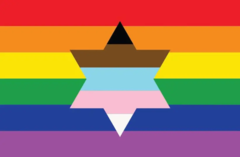Four Species, One Congregation
10/01/2023 10:00:34 AM
Beginning at sundown this evening, and continuing for the next seven days, Jews around the world will celebrate the festival of Sukkot. In addition to spending time in the booths or huts for which the holiday is named, the signature observance of this festival is the ritual of the Four Species, in which we hold together four plant products – a citron or etrog, a palm branch, a myrtle branch, and a willow branch – and shake them in all directions.
Personally, I have always found this practice a bit peculiar. What do the Four Species mean and why are we commanded to gather them? The Torah is frustratingly silent on these questions. Fortunately, the Midrash, a collection of rabbinic interpretations, offers a couple of explanations that not only illuminate the meaning of the Four Species, but also transform them into a metaphor for the inclusive community we have created at PTS.
One explanation is that the Four Species represent different types of individuals who comprise the Jewish people. This Midrash notes that the etrog has both flavor and aroma, just as some Jewish people engage in both Torah learning and the performance of good deeds. The date, the fruit of the palm tree, has flavor but no aroma. Similarly, some Jewish people are learned, but do not practice good deeds. The myrtle has a pleasant aroma but no flavor, just as some Jewish people practice good deeds but are not learned. Finally, the willow has neither flavor nor aroma, just as some Jewish people are neither learned nor practice good deeds.
Interestingly, the Midrash does not pass judgment on these different types of people. It does not describe some as more worthy than others or urge all of us to be like the etrog. Most importantly, it does not suggest that any of these people should be excluded from the community. Instead, it quotes God as saying, “Let all of these people bond together in one bundle and atone [i.e. repair or compensate] for each other.” Thus, the Four Species teach us that the Jewish community must include all kinds of people, and that united in our differences, we achieve strength and balance.
At PTS, we know that our congregation is strengthened when we reflect the full diversity of the Jewish people. Several years ago, our board of trustees approved an Inclusivity Statement, expressing our commitment to create a safe space for the full spectrum of the Jewish experience. This includes individuals who are new to Judaism, interfaith and multifaith families, and people of every age, race, background, ability, sexual orientation, gender identity or expression, marital or family status, health status, citizenship status, or financial position.
Our commitment to diversity isn’t just talk. We have acted, and continue to act, to make our congregation inclusive and accessible in every way. Non-Jewish members participate in their families’ life cycle events and are welcome to serve on committees and on our board of trustees. We have sponsored events designed to increase awareness of racial privilege and implicit bias within our community. We celebrate an annual Pride Shabbat and participate in the San Francisco Pride Parade, and our clergy celebrate and officiate LGBTQ+ weddings, anniversaries, and transgender renaming ceremonies. We encourage people to identify their pronouns and are sensitive to gendered language (even renaming our young adult initiation ceremony the gender-neutral “Bet Mitzvah”). We have been active, through education and advocacy, in efforts to stamp out the stigma of mental illness, and have worked to make our facility fully accessible to those with physical, visual, or hearing impairments. We truly want everyone to feel at home in our sacred community.
Another Midrash about the Four Species focuses on the shapes of the various plants, comparing each to a part of the human body. This Midrash notes that willow leaves look like lips, myrtle leaves resemble eyes, the palm is straight and tall like a spine, and the etrog is shaped like a human heart. Thus, according to this Midrash, the Four Species remind us of the many and varied ways we can serve God – with our words (mouth); with our insight or intellect (eyes); with our physical beings (spine); and with our feelings or emotions (heart).
Because we understand that different people relate to and express their Jewishness differently, PTS’s Vision and Mission is to be a place where everyone can find their own connection to Judaism. For those who connect to our faith through prayer, for example, we offer a variety of worship experiences, featuring inspiring sermons and beautiful music. Those who are drawn to Judaism’s rich scholarly tradition can engage in text study with our clergy and educators. Our programming invites members to explore their spirituality, delve into Jewish history and culture, or learn how Jewish teachings can guide them in their everyday lives. Our members can also express their Judaism through action by engaging in hands-on service activities, advocating for social justice, or delivering meals to fellow congregants.
Significantly, however, everyone who joins PTS – regardless of what they look like, who they love, what their abilities are, or what being Jewish means to them – becomes part of our nurturing community. Just as the Four Species, with their different attributes, are brought together under the canopy of the sukkah, our members come together in all their variety to share their commitment to Jewish heritage, celebrate in times of joy, and support one another in times of personal challenge or communal trauma. That is the beauty of our inclusive Jewish community.






